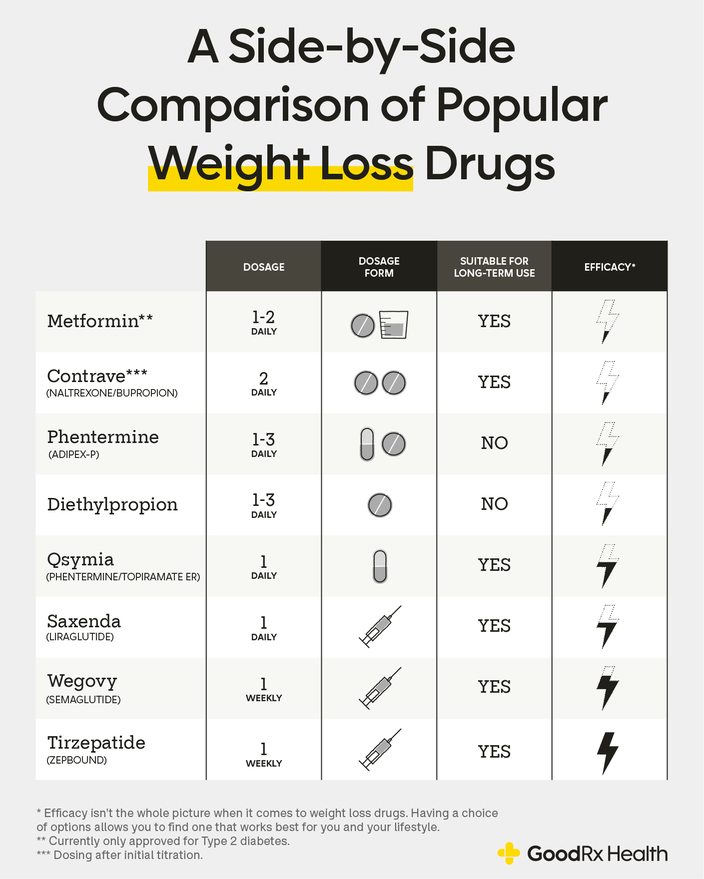
What Are the Best Prescription Weight-Loss Pills?
Key takeaways:
Weight-loss medications can help certain people meet their body weight goals. New injectables are getting a lot of attention, but several weight-loss medications are available as pills, too.
Some popular weight-loss pills are Contrave (naltrexone / bupropion), Qsymia (phentermine / topiramate ER), and phentermine (Adipex-P).
Some clinical studies suggest that Qsymia is the most effective weight loss pill. However, it’s a controlled substance that may not be the best option for everyone. There isn’t one weight-loss pill that’s widely considered to be the safest and most effective option overall.
Table of contents
You’ve likely heard all about the importance of a nutritious diet and routine exercise when it comes to achieving your target body weight. But for many people, reaching that target weight can be difficult without extra help.
In situations like these, weight-loss medications may be beneficial. There are several options to choose from, too. The best weight-loss medication for you will be the one that gives you the results you desire, with as few side effects as possible, and at a cost you can afford. Generally speaking, pills are a more affordable option than injectables.
Here's an introduction to prescription weight-loss pills.
What prescription weight-loss pills are available?
Weight-loss pills are a convenient needle-free option for people who need help losing unwanted body weight. Typically, people can lose up to 3% to 12% of their body weight while taking one of these medications.
Prescription-only pills that are FDA approved for weight loss are summarized below. They’re most effective when combined with lifestyle changes, such as a nutritious diet and routine exercise.
Keep in mind: FDA-backed weight-loss pills are highlighted in this list. But your healthcare professional could also prescribe a different pill, such as metformin or topiramate, for off-label use in weight loss.
Quiz: Test your knowledge about weight-loss pills
1. Contrave
Contrave is an oral tablet that combines two medications into one pill: naltrexone and bupropion. You gradually increase your dose during the first month of taking it. Once your body gets used to it, most people take 2 tablets every morning and 2 tablets every evening.
The active ingredients in Contrave work together to reduce your appetite and cravings for food. In initial studies, more than 40% of adults who took Contrave for 1 year lost at least 5% of their initial body weight. More than 20% lost at least 10% of their body weight. A healthcare professional may be more inclined to prescribe Contrave if you experience emotional eating.
A holistic approach: Combining weight-loss medication with lifestyle changes can improve your chances of success. Here, one person shares how a new diet and mindset helped keep him at his ideal weight.
Natural ways to mimic meds: GLP-1 receptor agonist medications such as Wegovy and Ozempic are popular for weight loss, but prescriptions for both are often limited. Fortunately, there are ways to boost your GLP-1 levels naturally.
What it’s like to take Qsymia: Qsymia is a low-cost, but highly effective, pill for those looking to lose weight. Three women discuss the benefits and downsides of taking it.
At this time, Contrave is only prescribed as a brand-name medication. A generic version isn’t available yet. And, it’s only approved for adults, so children can’t take it.
2. Qsymia
Qsymia (phentermine / topiramate ER) is another combination weight-loss pill. It’s a once-daily oral capsule for weight loss in people 12 years and older. It’s typically filled as a brand-name product, but a generic version has also been approved.
Qsymia works by reducing your appetite. In initial studies, Qsymia helped about 70% of adults lose at least 5% of their body weight after 1 year. Close to 50% of participants lost at least 10% of their body weight. And when compared to Contrave, researchers found that Qsymia is usually the more effective option.
However, since Qsymia contains phentermine, this medication is considered a controlled substance. It’s not the best option if you or a loved one have a history of substance misuse or dependency.
3. Phentermine
Phentermine (Adipex-P) is a prescription weight-loss medication that comes as a tablet and capsule. It’s available in both generic and brand name versions for people age 17 and older. But, it’s also a controlled substance and comes with health risks.
Unlike the medications above, phentermine is only FDA approved for use for up to 12 weeks at a time. That’s because when it was approved in 1959, there were no long-term studies to show that it was safe. And there were concerns that it could increase risk for heart disease. Some newer studies suggest that it can be safely used for longer than 12 weeks without increasing risk for heart disease. So your prescriber may recommend taking it for longer, depending on your personal risk and benefit.
Phentermine is one of the most commonly prescribed medications for weight loss, probably because of its low cost. Data suggests that it can help people shed about 3% to 5% of their initial body weight.
Benzphetamine, diethylpropion, and phendimetrazine are weight-loss pills that are similar to phentermine, but they’re prescribed less often. They’re also controlled substances meant for short-term use.
4. Orlistat
Orlistat (Xenical) is a brand-name prescription weight-loss pill. It’s an oral capsule that adults can take 3 times per day with meals. It’s less common than other weight-loss pills, though. Orlistat isn’t approved for kids or adolescents, and it can cause some bothersome side effects.
Still, orlistat works by helping your body absorb less fat from the meals you eat. It can also reduce the risk of regaining weight after losing weight. In initial studies, orlistat helped up to 55% of adults lose 5% or more of their body weight after 1 year. Up to 25% lost at least 10% of their body weight.
A lower-dose version of orlistat, Alli, is available over the counter. It can support weight loss in adults alongside a low-fat, low-calorie diet, but the effects are less than the prescription dose.
5. Plenity
Plenity isn’t technically a medication. It’s a medical device that contains cellulose and citric acid. The FDA cleared it to be used as a weight-loss aid in the form of a prescription-only pill. Certain adults who are considered overweight or obese are eligible to take it.
This oral capsule is designed to help you eat less throughout the day. After you take it, it expands inside your stomach and small intestine to promote feelings of fullness. It doesn’t enter your bloodstream, either. Rather, it starts to break down after it reaches your large intestine. In initial studies, about 60% of people taking Plenity lost at least 5% of their body weight after 6 months of use.
One downside to Plenity is the number of pills you’d need to take per day. The typical dosage is 3 pills, twice daily with a full glass of water.
Important: Plenity has been reportedly discontinued by its manufacturer. It’s no longer available for purchase.

How long does it take for weight-loss pills to work?
Every weight-loss pill, or diet pill, operates on its own timeline. And the amount of time that’s needed to see results varies from person to person. But there are some general trends to keep in mind.
Here’s a quick summary of how long it typically takes for weight-loss pills to start working:
These medications’ full benefits can take even longer to set in. Your prescriber can tell you more about a timeline you can expect to potentially see.
What is the best prescription weight-loss pill?
It’s hard to say which is the best weight-loss pill. That’s because it varies by person. The best weight-loss pill for you is one that helps you lose about 5% to 10% of your initial body weight with few or tolerable side effects. There are other considerations too, such as how often you need to take medication, and of course, cost.
Because of this, different medications or combinations of medications will suit different people best. Having a choice of options is important for finding one that works for you and your lifestyle.
Based on data reported in clinical studies, Qsymia is likely the most effective prescription weight-loss pill. It tends to lead to the largest amount of weight loss in the highest percentage of people. But it’s important to have a conversation with your prescriber about the potential risks of controlled substances like Qsymia.
When will my doctor prescribe weight-loss pills?
The decision to start taking a weight-loss pill is a personal one. If diet and exercise changes aren’t enough, you and your prescriber may start to consider weight-loss medication if you have:
A body mass index (BMI) higher than 30
A BMI of 27 with other related health problems, such as high cholesterol, heart disease, or Type 2 diabetes
Make sure to talk to a healthcare professional who prescribes weight-loss medications about your overall treatment goals. Based on your body weight goals, preferences, and side effects you want to avoid, they can help you narrow down your options to the best treatment.
Also let them know what you’re willing to potentially spend on a weight-loss pill. Many of these medications aren’t covered by prescription insurance plans, so there’s a good chance you’ll have to pay out of pocket.
How to save on weight-loss pills
There are many ways to save on weight-loss pills. GoodRx can help you navigate your options, which may include GoodRx discounts, copay savings cards, and patient assistance programs. You can find weight-loss medication prices as low as $11 with a free GoodRx discount.
Injectable prescription weight-loss drugs
Many of the top upcoming weight-loss drugs are injectable medications. But some are already FDA approved and available in the U.S.:
Zepbound (tirzepatide): Zepbound is a once-weekly injectable medication and type of dual GLP-1/GIP receptor agonist. It tends to help people lose up to 15% to 20% of their initial body weight. Zepbound also appears to generate superior weight loss to Wegovy.
Wegovy (semaglutide): Wegovy is a once-weekly GLP-1 agonist medication. In clinical studies, many people receiving Wegovy lost up to 15% of their initial body weight. It can also reduce the risk of serious heart problems, such as a heart attack or stroke.
Saxenda (liraglutide): Saxenda is another GLP-1 agonist. But compared to Wegovy, it’s injected once daily instead of once weekly. A head-to-head study also found that Wegovy tends to promote more weight loss than Saxenda.
Imcivree (setmelanotide): Imcivree is a once-daily injection, but it’s only used for weight loss in people living with certain genetic conditions. It’s less common than other weight-loss medications.
Keep in mind: Ozempic (semaglutide) is well known for its potential weight-loss benefits. But this injectable medication isn’t officially approved for this purpose. It’s a Type 2 diabetes medication that also has heart benefits.
Frequently asked questions
Weight-loss pills are just one tool to consider if you’re looking to lose weight. You can focus on your diet by increasing your protein intake, reducing your refined carbohydrate intake, and avoiding unnecessary liquid calories, among other options. Strength and cardio exercises can also help. Weight loss apps can be another tool in your arsenal to help you log meals, track exercise, or receive support from weight-loss coaches. Of course, injectable weight-loss medications are an option too.
Some people consider Qsymia to be the strongest weight-loss pill. But this isn’t always the case. Everyone responds differently to medications, especially weight-loss pills. Ask your prescriber about the safest and most effective medication for your body-weight goals.
The bottom line
Prescription weight-loss pills are most effective when combined with a nutritious diet and routine exercise. The most effective pill for many people is Qsymia, but it’s not meant for everyone. Depending on your health goals, personal preferences, and medical history, your healthcare professional can help you find the best treatment for your situation. And if weight-loss pills don’t work, there is an increasing number of injectable medications available, although cost is a factor.
Why trust our experts?


References
Apovian, C. M., et al. (2015). Pharmacological management of obesity: An Endocrine Society clinical practice guideline. The Journal of Clinical Endocrinology and Metabolism.
Gelesis, Inc. (n.d.). Plenity instructions for use.
Greenway, F. L., et al. (2018). A randomized, double‐blind, placebo‐controlled study of Gelesis100: A novel nonsystemic oral hydrogel for weight loss. Obesity.
H2-Pharma LLC. (2022). Orlistat - orlistat capsule [package insert].
Hibbert, C. M. (2024). Older weight loss drugs are in demand. But are they safe or effective? And should you take them? Northeastern Global News.
Khera, R., et al. (2016). Association of pharmacological treatments for obesity with weight loss and adverse events: A systematic review and meta-analysis. Journal of the American Medical Association.
Kraftson, A., et al. (2024). What should I know about injectable weight-loss medications? Journal of the American Medical Association Internal Medicine.
Lewis, K. H., et al. (2019). Safety and effectiveness of longer-term phentermine use: Clinical outcomes from an electronic health record cohort. Obesity.
Nalpropion Pharmaceuticals LLC. (2024). Contrave extended-release - naltrexone hydrochloride and bupropion hydrochloride tablet, extended release [package insert].
National Institute of Diabetes and DIgestive and Kidney Diseases. (2024). Prescription medications to treat overweight and obesity.
Tak, Y. J., et al. (2021). Long-term efficacy and safety of anti-obesity treatment: Where do we stand? Current Obesity Reports.
U.S. Food and Drug Administration. (2024). FDA approves first treatment to reduce risk of serious heart problems specifically in adults with obesity or overweight.
Yanovski, S. Z., et al. (2014). Long-term drug treatment for obesity: A systematic and clinical review. Journal of the American Medical Association.

























